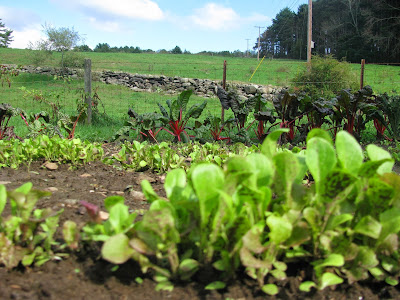Greetings Friends both Old and New,
It's been about 3 weeks now since I said 'see ya later' to the place I've called home for the majority of my college career. It was a tough goodbye and came only after trudging through the snow in crocs around the perimeter of Spring Valley bidding farewell to all that has become so familiar to me. I was flooded with nostalgia as the cold air blew across my face and my feet unsurprisingly became wet. It wasn't until I circled around the back gate after passing the garden beds, herbs, chicken coop, our greenhouse and shed when I was stopped. I took a quick seat on our rock wall that supports the asparagus patch and began to think long about the years that had just passed. I looked at the frozen ground, plants and roots of the farm and was drawing similarities between the many fond memories stuck in time only to be unearthed and thawed out by those who shared them alongside with me. Realizing at this point, that my time spent at Spring Valley Student Farm has been nothing short of a journey.
When I arrived about three years ago, I was oblivious to what was ahead. I had no idea the opportunity presented in front of me would shape me so much into the person I have become today. I came to Spring Valley with practically no farming experience and minimal exposure to living with a group, aside for one year in the dorm. For me though, I was ready. Ready to live on my own, ready to start cooking for myself and beginning a new time of personal and spiritual growth. Looking back on these years I am so grateful I listened to that little bird on my shoulder telling me this would be a good choice in the long run.
What SVSF has taught me far exceeds simply when to plant and harvest garlic, or how to sort through seed catalogs without going crazy deciding on the perfect cultivars, or even how to pick up and raise a chicken. The experience here has shown me so much on where I fit into the dynamic of a growing community. I've learned a ton about myself and others, too- that everyone is here for their own reasons. I might've been here to become more independent, get off campus and learn some life skills. Someone else might be here to develop a deeper understanding of the ecological interactions of our own backyard. Others might be here just to enjoy the peaceful quiet and fresh air, maybe even just to birdwatch. The point is, whatever the reason, no matter who the person is, how vocal or silent they are, how passionate or seemingly lazy they are, everyone has a skill to bring to our community. What makes a successful community is being able to identify those things that each person brings to the table and how to efficiently allocate all the energy that we are putting into this system. The success comes with a greater understanding of each other so we can get a greater understanding of the land and the projects at hand. SVSF truly has been a shining light on my college experience, and I feel unbelievably lucky to have been a part of this adventure.
That said, I want to quickly thank everybody who has made the farm what it is today. Thanks firstly to UConn Dining Services and all those in ResLife who deal with our requests and support our projects. Without them, the farm would not be able to function. To all past and current farmers, volunteers, friends just hanging out, you are what makes the bond at SVSV so strong, and will keep the spirit of the farm alive. To Julia, our farm manager, mentor and friend, there aren't enough thank you's I can type for what you have done for the Spring Valley and all of us down here. You have been a wealth of knowledge and a true backbone to our community. It takes a lot to continuously stay organized and put up with a dozen college students that may or may not want to wake up on an early cold Sunday morning in October to harvest kale or turnips. Thank you thank you all!
OK, OK this concludes my sappy farewell to my farm family. BUT, before I hit post, I'd like to put a few of my favorite pictures from my time here (thank you to those whose few photos I did borrow). Cheers and as always, Sunny Wishes!
Be Well,
Andrew Lyons


































